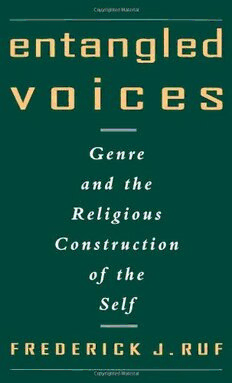
Entangled Voices: Genre and the Religious Construction of the Self PDF
Preview Entangled Voices: Genre and the Religious Construction of the Self
Entangled Voices This page intentionally left blank Entangled Voices Genre and the Religious Construction of the Self FREDERICK J. RUF New York Oxford OXFORD UNIVERSITY PRESS 1997 Oxford University Press Oxford New York Athens Auckland Bangkok Bogota Bombay Buenos Aires Calcutta Cape Town Dar es Salaam Delhi Florence Hong Kong Istanbul Karachi Kuala Lumpur Madras Madrid Melbourne Mexico City Nairobi Paris Singapore Taipei Toyko Toronto and associated companies in Berlin Ibadan Copyright © 1997 by Frederick J. Ruf Published by Oxford University Press, Inc. 198 Madison Avenue, New York, New York 10016 Oxford is a registered trademark of Oxford University Press All rights reserved. No part of this publication may be reproduced, stored in a retrieval system, or transmitted, in any form or by any means, electronic, mechanical, photocopying, recording, or otherwise, without the prior permission of Oxford University Press. Library of Congress Cataloging-in-Publication Data Ruf, FrederickJ., 1950— Entangled voices: genre and the religious construction of the self/ Frederick J. Ruf. p. cm. Includes bibliographical references and index. ISBN 0-19-510263-0 1. Religious literature, English—History and criticism—Theory, etc. 2. Donne, John, 1572-1631. Holy sonnets. 3. Wilson, Robert, 1928- Einstein on the beach. 4. Coleridge, Samuel Taylor, 1772-1834. Biographia literaria. 5. Levi, Primo. Sistema periodico. 6. Self in literature. 7. Literary form. I. Title. PR145.R85 1997 820.9'382—dc20 96-41281 Versions of four of these chapters have previously been published: Chapters 1 and 2, The Voices of Narrative, Lyric, and Drama and "Jogona's Great Treasure": Narrative, Lyric, and Dramatic Intelligibility, appeared in Journal of the American Academy of Religion 62 (1994) under one title, The Consequences of Genre: Narrative, Lyric, and Dramatic Intelligibility. Chapter 3, "Intoxicated with Intimacy": The Lyric Voice in John Donne's Holy Son- nets, was published in Harvard Theological Review 86 (1993) under the title Lyric Auto- biography: John Donne's Holy Sonnets. Copyright 1993 by the President and Fellows of Harvard College. Reprinted by permission. Chapter 6, "Harmonized Chaos": The Mixed Voice of Coleridge's Biographia Liter- aria, appeared in Soundings 75 (1992) under the title Coleridge's Biographia Literaria: Extravagantly Mixed Genres and the Construction of a "Harmonized Chaos." All these articles have been modified for inclusion in this volume. 135798642 Printed in the United States of America on acid-free paper To Nelle Yarboro Ruf This page intentionally left blank Acknowledgments For six years, from 1988 until 1994, the topics in this book were a continual source of conversations with my friends, family, colleagues, and students, even with my children as we read bedtime stories. I doubt, therefore, that I can acknowledge adequately all who helped these thoughts move along. Gordon Kaufman, as always, was provocative and seminal; every scholar should have the benefit of his conversation. Of great value were Richard Niebuhr and William Graham, in whose seminar twelve years ago these thoughts first glimmered. James Engell sharpened my thinking and informed it with sources, especially for the chapter on Coleridge. Colleagues at Georgetown University provided just the intellectual atmosphere one hopes for in academia. In particular, Theresa Sanders and Joe Murphy gave me the sort of lunch table and office door stimulation that should have produced a far better book. John Glavin, Jim Donahue, Francisca Bantly, Victoria Pedrick, Diane Yeager, Charles Winquist, and Stanley Hauerwas provided helpful stimulus or support. Stephen Webb read the manuscript with eyes that saw subtleties I had never perceived. His suggestions gave the book qualities that certainly strengthen it. I would like to acknowledge the Landegger Fund for both summer and semester research leaves; Efrat Tseelon's conference on Mask, Masquerade, and Carnival in Venice in 1994, which helped me develop the chapter on Robert Wilson; Ales- sandra Farkas and Lewis Rosenbluth, who assisted my research on viii ACKNOWLEDGMENTS Wilson; the theater and film archives of the Lincoln Center library for its videotape of Einstein on the Beach', and several of the anonymous readers whose comments improved the chapters that were previously published. Irene Ovadia came somewhat late to this study but enriched it in ways that reach into every chapter. Any subtlety that my sense of voices might have is due greatly to her, but that is really but a small part of it. Finally, if the deconstructive critics are correct (and I believe they are), we are constantly being written through, with dissemination's flow. I hope that theory recognizes the primacy of family in the process. Christine, Joanna, and Jesse did not just provide forebearance and sup- port; they weren't only the creative medium. We all wrote the book. Contents Introduction: Hearing Voices 3 Chapter 1. The Voices of Narrative, Lyric, and Drama 11 The Three Characteristics of Narrative 15 Lyric 19 Drama 21 Chapter 2. " Jogona's Great Treasure": Narrative, Lyric, and Dramatic Intelligibility 25 Intelligibility: Comprehensiveness and Cohesion 29 Conclusions 35 Chapter 3. "Intoxicated with Intimacy": The Lyric Voice in John Donne's Holy Sonnets 37 Unruly Autobiography 39 Donne's Holy Sonnets 41 Donne's Lyric Self 42 The Lyric Voice 48
